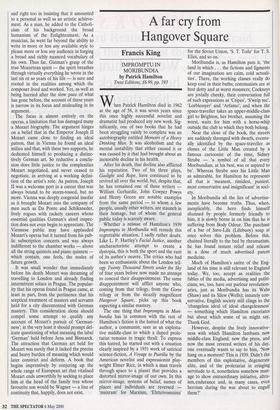A far cry from Hangover Square
Francis King
IMPROMPTU IN MORIBUNDIA by Patrick Hamilton Trent Editions, £6.99, pp. 193 When Patrick Hamilton died in 1962 at the age of 58, it was seven years since this once highly successful novelist and dramatist had produced any new work. Sig- nificantly, one of two books that he had been struggling vainly to complete was an autobiography entitled Memoirs of a Heavy Drinking Man. It was alcoholism and the mental instability that either caused it or was caused by it that had brought about an inexorable decline in his health.
After his death, that decline also afflicted his reputation. Two of his three plays, Gaslight and Rope, have continued to be revived all over the world; but, despite that, he has remained one of those writers William Gerhardie, John Cowper Powys and Henry Green are notable examples from the same period — to whom a few people, usually other writers, are staunch in their homage, but of whom the general public today is scarcely aware.
Whether a reissue of Hamilton's 1939 Impromptu in Moribundia will remedy this regrettable situation, I sadly rather doubt. Like L. P. Hartley's Facial Justice, another uncharacteristic attempt to create a dystopia, this is both the sport and the runt of its author's oeuvre. The critics who had been so enthusiastic about the London tril- ogy Twenty Thousand Streets under the Sky of four years before now made no attempt to conceal their disappointment. The same disappointment will afflict anyone who, coming from that trilogy, from the Gorse trilogy or from the sleazily magnificent Hangover Square, picks up this book expecting a similar mastery.
The one thing that Impromptu in Mori- bundia has in common with the rest of Hamilton's fiction is the hatred of what the author, a communist, sees as an exploita- tive middle-class to which a duped prole- tariat remains in tragic thrall. To express this hatred, he started out with a situation clearly inspired by a 1931 work of satirical science-fiction, A Voyage to Puerilia by the American novelist and expressionist play- wright Elmer Rice, in which a man travels through space to a planet that provides a distorted mirror-image of our own. In this mirror-image, systems of belief, names of places and individuals are reversed — `msbaam' for Marxism, 'Ehtteivosnoinu' for the Soviet Union, 'S. T. Toile' for T. S. Eliot, and so on.
Moribundia is, as Hamilton puts it, `the land in which . . . the fictions and figments of our imagination are calm, cold actuali- ties'. There, the working classes really do keep coal in their baths; communists are at best dotty and at worst monsters; Cockneys are jovially cheeky, their conversation full of such expressions as 'Cripes', 'S'welp me', lorblessyer' and `Arfamo'; and when the space-traveller takes an upper-middle-class girl to Brighton, her brother, assuming the worst, waits for him with a horse-whip outside the club to which they both belong.
Near the close of the book, the streets are suddenly thronged with dwarfs, eventu- ally identified by the space-traveller as clones of the Little Man created by a famous cartoonist of the time, Sidney Strube — `a symbol of all that every Moribundian, at his best, was or aspired to be'. Whereas Strube sees his Little Man as admirable, for Hamilton he represents all that is `meanest, timidest, puniest, most conservative and insignificant' in soci- ety.
In Moribundia all the lies of advertise- ments have become truths. Thus, when, inexplicably, the hero finds himself shunned by people formerly friendly to him, it is slowly borne in on him that he is suffering from Body Odour. The purchase of a bar of Save-Life (Lifebuoy) soap at once solves this problem. Before this, chained literally to the bed by rheumatism, he has found instant relief and release in a dose of much advertised patent medicine.
Much of Hamilton's satire of the Eng- land of his time is still relevant to England today. We, too, accept as realities the fables of the media, advertising and politi- cians; we, too, have our parlour revolution- aries, just as Moribundia has its Wahs (Shaw) and its Sllew (Wells); innately con- servative, English society still clings to the `changeless ideal of ideal changelessness' — something which Hamilton excoriates but about which some of us might say, Thank God.
However, despite the lively innovative- ness with which Hamilton lambasts now middle-class England, now the press, and now the most revered writers of his day, one eventually wants to say to him, `Now hang on a moment! This is 1939. Didn't the members of this exploitative, degenerate elite, and of the proletariat in cringing servitude to it, nonetheless somehow man- age to show extraordinary initiative, altru- ism, endurance and, in many cases, even heroism during the war about to engulf them?'


































































 Previous page
Previous page